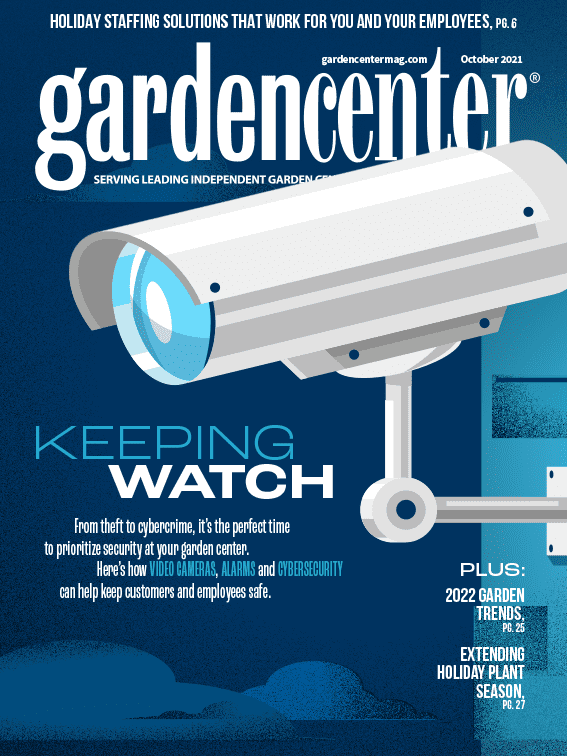

We all know that when it comes to retail staff, scheduling can make you or break you. During the holidays, which are already particularly stressful for us all, keeping customers and employees happy with your staff schedules can get tricky. If you are the one tasked with creating your staff schedules, you’ve probably begrudgingly accepted that there’s no way to make everyone happy and still meet customer expectations. It can feel like a never-ending, unwinnable game of checkers.
Even so, with pressures on the service industry and retail staff at a seemingly all-time high — and new recruits hard to find — I would suggest that taking care of the staff you have is a top priority this holiday season. The pandemic has been tough on all of us, especially consumer-facing service workers. Our garden center retail staff falls squarely into that category, and I suspect they feel pretty worn out. Getting a break on holidays and the ability, if they can, to spend a little extra time with family this year is probably in order.
How do you manage when everyone wants time off at the same time? In my experience our industry, and many others, tend to defer to tenure when deciding who “has to work” the holiday. New employees get stuck with working the holidays or the holiday eves. I’m not sure this is a great strategy for indoctrinating new staff into your company culture or retaining them once you’ve invested the time and resources to do so. Plus, you may have existing long-term staff who would rather work holiday shifts for alternative comp time.
In fact, I think comp time might be one of the best things you can offer your staff when they make concessions to work holidays or the shifts on the shoulder days around those holidays. I’m sure you are probably already offering paid holidays and trade-out paid holidays for those who work your holiday shifts. But what if you offered extra paid comp days for those who volunteer to work the less popular holiday slots? Work Christmas Eve? Get two paid comp holidays instead of one or perhaps some extra holiday bonus cash. Be creative with your incentives but make them meaningful. Also, don’t put too tight a timeline on when staff can use their comp days — give them a year to use them.

Encourage volunteers
Self-scheduling is one staffing concept that could help alleviate scheduling stresses in the retail and service industry. Self-scheduling sounds great, but inevitably you end up with shifts going uncovered. However, if you adequately incentivize your staff to volunteer to work times that are traditionally tough for you to schedule, it’s a win/win for everyone. Be sure to make holiday shift incentives clear to staff well in advance of when you need them to work and make signing up for holiday shifts, and asking off for a holiday, required farther in advance than your normal vacation notice period.
Blackout dates might be necessary at times, but I’d recommend keeping them to a minimum. The fact that most green industry employees are prohibited from taking any vacation for the entire spring season (or summer — whenever you have your peak season) makes working holidays even more distasteful. Before I left to run my own company, I’d spent 20+ years working my tail off all year long, but I couldn’t use any of my hard-earned vacation days (be they oh so few) from February or March through May. Not to mention I typically worked six to seven days a week every spring. I was utterly exhausted. I never got enough vacation during the year and I missed many beautiful spring seasons in my own garden and for traveling. So do your employees. It’s not good. If you put the same vacation restrictions on your staff over holidays, you are risking not having any skilled staff at all.

Consider closing
When it comes to any given holiday, or its shoulder days, I think a valid question is: Do you really need to be open at all? What are you really gaining from staying open, especially if traffic is historically low? You could be losing more in terms of staff morale than you’re gaining in sales. Ultimately, that decision comes down to analyzing your sales and traffic history for those days over the last several years and aligning it with your brand identity and local market expectations.
If you’re an IGC that historically does increased business during the Thanksgiving or Christmas holidays and your sales and foot traffic history for the last few years support this trend, then staying open and staffed may be necessary. But if your sales and traffic history for traditional holidays just isn’t there, you might be wasting resources. Are those two or three last-minute stragglers who come in on Christmas Eve to buy a “clearance” tree making you money? Or are they going to cost you good employees?
Innovative holiday incentives aren’t only for your employees; they are also for your customers. Want to close your doors on a holiday you’ve traditionally been open? Incentivize your customers to place online orders on days the shop is closed to get a special discount or bonus plant material with their order. Or double their customer loyalty reward points earned for online orders placed on days your shop is closed. You get the gist. This could be a terrific way to maintain sales and “foot traffic” without having to staff at all. Plus, it provides you with new marketing opportunities.
When you rely on humans to staff your garden center, you’ll need to inject some humanity and compassion into your scheduling practices. Think about what you can give so your staff can give back. ‘Tis the season after all!

Explore the October 2021 Issue
Check out more from this issue and find you next story to read.
Latest from Garden Center
- The Family Business, Part 2: Agreeing (and disagreeing) on Capital Investments
- Registration opens for Darwin Perennials Day
- Weekend Reading 5/3/24
- Weekend Reading 4/26/24
- Smith Gardens assumes operations of Skagit Horticulture
- Beneficial insect sachets now included with Monrovia mandevilla
- Pennsylvania Horticultural Society shares top gardening trends from 2024 Philadelphia Flower Show
- Garden Media Group announces the fifth annual Women in Horticulture Week





